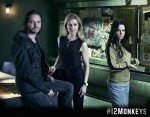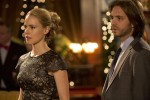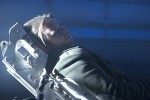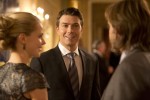Syfy’s 12 Monkeys: Mind and time bending drama
by Doc on Dec.11, 2014, under Television
 Syfy’s upcoming drama series 12 Monkeys, based on the 1995 Terry Gilliam movie starring Bruce Willis and Brad Pitt, has the potential to really pull out all the questions regarding time travel, and twist your mind while it does.
Syfy’s upcoming drama series 12 Monkeys, based on the 1995 Terry Gilliam movie starring Bruce Willis and Brad Pitt, has the potential to really pull out all the questions regarding time travel, and twist your mind while it does.
The show follows the journey of a time traveler, Cole, from the post-apocalyptic future. Using a dangerous and untested method of time travel, Cole arrives in the present day on a mission to locate and eradicate the source of a deadly plague that will eventually decimate 93.6% of the human race. Will Cole be able to save the fate of mankind or is mankind bound by fate? Taking place in the ravaged future of 2043 and the present day (2015), 12 Monkeys explores themes of destiny, fate, love and the possibility of second chances.
Could you go back on a mission to kill someone, especially if killing that person will create a paradox that will wipe you from existence? What if it would save 7 billion people? And what if you fell in love in the process?
Check out the preview below, along with some behind the scenes looks and a transcript of the panel from the Syfy Press Tour. But first, a few thoughts about the show.
 I didn’t care much for the movie. I thought it was too convoluted, and if it takes several viewings to understand and enjoy, it failed. It has, however, achieved a cult status and did raise interesting questions about time travel. As such, I wasn’t expecting to like the show. However, it’s difficult to remember sometimes that “based on” does not equal “scene for scene remake”. It appears that with the expanded time in which the story can be told, they can perhaps do a better, easier telling of the story and allow the characters to develop. I found that the longer I watched that I was getting more interested in the story. And if you can suck me in from a outside at the start, you’re doing a pretty good job.
I didn’t care much for the movie. I thought it was too convoluted, and if it takes several viewings to understand and enjoy, it failed. It has, however, achieved a cult status and did raise interesting questions about time travel. As such, I wasn’t expecting to like the show. However, it’s difficult to remember sometimes that “based on” does not equal “scene for scene remake”. It appears that with the expanded time in which the story can be told, they can perhaps do a better, easier telling of the story and allow the characters to develop. I found that the longer I watched that I was getting more interested in the story. And if you can suck me in from a outside at the start, you’re doing a pretty good job.Classic Doctor Who fans may also recognize one of the aspects of the “Blinovitch Limitation Effect” being applied in the first episode. 🙂
12 Monkeys stars Aaron Stanford (The Hills Have Eyes, X-Men 2) as James Cole, the time traveler from 2043 looking to redeem himself by preventing the release of the plague by the mysterious “Army of the Twelve Monkeys” that kills 7 billion people. He is helped by Cassandra Railly (Amanda Schull, Suits, Pretty Little Liars), a person from the present day who lost her jobs and standing as a doctor when Cole accidentally arrives too early for his mission, is shot right in front of her, and then disappears in a flash only to re-appear two years later, still wounded.
Here is a transcript of the panel at the Syfy Press Tour with Stanford and Schull talking about the show, along with Bill McGoldrick, Syfy’s EVP for Original Content and Travis Fickett Co-Executive Producer of the show:
BILL McGOLDRICK: Hi, guys. So our first panel of the day for the shows is 12 Monkeys, which you guys probably know based on the Universal film, based on a character named Cole who is on a journey from 2043 to present day, and we’ve got a lot of great panelists for you today that I think I’m introducing right now. So, first is Aaron Stanford.
(Applause.)
BILL McGOLDRICK: Who plays our time traveler, Cole. Right behind him is Amanda Schull, who plays Cassandra Railly.
(Applause.)
BILL McGOLDRICK: And one half, but the most important half of the writing team responsible for 12 Monkeys, Travis Fickett, who actually used to do this for a living, so throw the fastball questions to him. He was a journalist before he wrote 12 Monkeys, so he’s prepared and has a lot of media training, but let me — let me throw you a clip right now.
(Clip shown.)
(Applause.)
BILL McGOLDRICK: All right. Let me kick it off with a couple of questions.
So, Travis, why don’t you tell the room why you thought this was the perfect time to do 12 Monkeys and a bit about the genesis of the project?
 TRAVIS FICKETT: The perfect time? I mean, I think because the audience was ready for a serialized time-travel show, something that we — Terry and I always wanted to do, and they, I think, were educated. The audience is educated now as to the intricacies of that kind of narrative style. Lost tricked everyone into doing a time travel show. At the start of season four, they’re like, “Oh, by the way, we’re a time travel show now” and it worked really well. I think it’s always been a, I think, under-utilized part of science fiction in television. Most of the time it was, you know, touched by a time traveler — oh, that sounds bad. But it was episode of the week or it was procedural or, you know, it wasn’t a continual story like a larger canvas. And the cool thing about 12 Monkeys was always — the movie was, it was this big pillbox, it was this great mystery, and it all kind of tied together as the audience unraveled it. And it does feel like what you get out of serialized television.
TRAVIS FICKETT: The perfect time? I mean, I think because the audience was ready for a serialized time-travel show, something that we — Terry and I always wanted to do, and they, I think, were educated. The audience is educated now as to the intricacies of that kind of narrative style. Lost tricked everyone into doing a time travel show. At the start of season four, they’re like, “Oh, by the way, we’re a time travel show now” and it worked really well. I think it’s always been a, I think, under-utilized part of science fiction in television. Most of the time it was, you know, touched by a time traveler — oh, that sounds bad. But it was episode of the week or it was procedural or, you know, it wasn’t a continual story like a larger canvas. And the cool thing about 12 Monkeys was always — the movie was, it was this big pillbox, it was this great mystery, and it all kind of tied together as the audience unraveled it. And it does feel like what you get out of serialized television.
So, when we — you know, Terry and I had written another time-travel project and demonstrated we knew how to do that. And we met up with Atlas, with Chuck Roven and Richard Suckle, who had been dying to make this into a T.V. show and they just couldn’t figure it out. That’s how it — that was the genesis.
BILL McGOLDRICK: Great. Aaron and Amanda, two pretty iconic roles that you have to play. Any trepidation about that? How did you approach playing roles that had already been portrayed on a different screen?
AARON STANFORD: Well, you know, I really just approached it the way I approach any role. It’s such a — it’s such a daunting thing to try and fill the shoes of somebody else, particularly somebody like Bruce Willis who was such a — you know, played such an iconic role. I just had to sort of push that aside and not think about that, and approach it as I do any other role where I just want to make the character engaging and interesting and real and make him somebody that the audience can connect to.
BILL McGOLDRICK: Amanda?
AMANDA SCHULL: I agreed with everything that Aaron said, and I am just going to piggyback on that and say also that while we are taking on those roles, at the same time, we’re sort of departing from the characters that were in just the film and taking the series down a chain of rabbit holes that the film wasn’t able to portray in their finite amount of time in the film. So while we are the characters from the film, we’re reimagining and a sort of expansion of those characters as well, so we’re not exactly the same people.
BILL McGOLDRICK: It’s a different universe.
AMANDA SCHULL: Yeah.
BILL McGOLDRICK: Absolutely, and maybe a better one. I’ve seen a lot of episodes, guys. You’re going to be really excited, but let me open it up to questions from the room.
AMANDA SCHULL: Not everybody at once.
QUESTION: So what similarities or differences do you expect from the movie?
TRAVIS FICKETT: We are going to diverge pretty widely from the movie. I think you can — there’s a spiritual continuity, in a way. I think it feels like the movie a lot of times in that the hero is an unlikely hero. He’s doesn’t have the best time machine to achieve this mission. There is a tinge of madness and craziness throughout the whole story, and that, kind of, was one of the central sort of tenets of the movie.
And it’s also, in the movie, you didn’t know until the end what the 12 monkeys were and, you know, how the virus broke out and all of those things, and that’s going to be the same kind of mystery that we’re dealing with. But it wouldn’t be any fun for anybody if we just did the television version of that story, you know. So we’re taking all of the elements that we kind of loved, the impressions from the movie, and not the straight, you know, checklist of story items.
I think fans will be pleased with what we took and what we expanded and what we changed. I am. And I’m the biggest fan of that movie, like I’ll fight anyone here who says they’re a bigger fan of that movie than me. So, I would lose, but I’d still try to fight you. So yeah, I think people will be happy.
AARON STANFORD: The pilot adheres pretty — relatively closely to the movie and then it takes a very dramatic turn, I think, right with episode two, if I’m correct, and from there on its own thing.
QUESTION: How difficult is it to take on a movie — or I’m sorry, take on a series where a lot of people are familiar with the movie? I know it’s been done successfully, just recently, with Fargo and things like that, but when you’re a fan of the film, how do you as a writer, even as actors, how do you kind of really make sure you separate yourself so that you know what you have; you have the elements, like you have that weird balance where you have the elements of the movie that everybody likes, but also your own thing at the same time? Like how do you find that, that right balance to make that work so you have your own thing but still pay homage to what you’re — you know, what you’re adapting?
 TRAVIS FICKETT: Do you want me to take that? You know, there is a moment where you’re intimidated and you’re like, 12 Monkeys? That’s a perfect movie, I can’t — I can’t write, I can’t do this. And then you just start writing a story, and the story becomes what it is. It becomes its own thing. And I think these guys, it’s the same thing. They get a script with characters on the page and so, you know, their Cole and Cassie are their own identities, their own entities, and it’s not like they have to sit there and go, but wait, this is different than the movie, hold on. They don’t call us up and say, look, I just rewatched the movie and your script is not right. And they’ve done an amazing job of creating very distinct characters that are — that are unto themselves, just like, you know, in Fargo, the T.V. series, I don’t think anybody is angry that Billy Bob’s character was not in the movie. I think that worked pretty well.
TRAVIS FICKETT: Do you want me to take that? You know, there is a moment where you’re intimidated and you’re like, 12 Monkeys? That’s a perfect movie, I can’t — I can’t write, I can’t do this. And then you just start writing a story, and the story becomes what it is. It becomes its own thing. And I think these guys, it’s the same thing. They get a script with characters on the page and so, you know, their Cole and Cassie are their own identities, their own entities, and it’s not like they have to sit there and go, but wait, this is different than the movie, hold on. They don’t call us up and say, look, I just rewatched the movie and your script is not right. And they’ve done an amazing job of creating very distinct characters that are — that are unto themselves, just like, you know, in Fargo, the T.V. series, I don’t think anybody is angry that Billy Bob’s character was not in the movie. I think that worked pretty well.
AARON STANFORD: I think it’s both daunting and very exciting as a fan to get an opportunity to do something like this, because in a way you can just sort of just touch that movie that you love so much and feel like maybe you’ll get a chance to live inside of it a little bit. But in terms of making sure that it’s a different thing, I just — it just happened naturally. You have an entirely different team. You have an entirely different, you know, cast, creative team, and the differences — it just happens naturally. Can’t help but be different.
AMANDA SCHULL: Different story line.
AARON STANFORD: Yeah.
QUESTION: Can you talk about, how far are you into filming and like where are you filming, like which city?
TRAVIS FICKETT: Say that again?
QUESTION: How far are you into filming, like how many episodes have you completed or are you still working?
TRAVIS FICKETT: We are about to start filming episode 10. We’re on 9 now.
AMANDA SCHULL: 109.
QUESTION: And then where are you filming?
AARON STANFORD: We’re in Toronto.
QUESTION: Can I ask Amanda? I loved seeing you in Pretty Little Liars. How does that compare with working on a sci-fi show, compared to like teen drama and things like that?
AMANDA SCHULL: Very different. It’s very different. It’s very exciting. I think the Pretty Little Liars and the One Tree Hill have their own exciting story lines that are, at times, unpredictable and seemingly almost science fiction, asking their unrealistic qualities. But I think this has been an incredible gift for me. The character that Terry and Travis have written in Cassandra is a dream. She’s strong and smart and she doesn’t back down from a challenge, and it’s a real honor to be able to play something like that, and not a woman who, when confronted with an obstacle, becomes less than. She will always stand up to a challenge.
And also, the element of time travel and alternate realities, I think in a lot of ways is every actor’s dream to be able to be one character on a television show, but to have all these different incarnations of that person. We get to go to work and some days I’m, you know, a person living in one reality, and some days I’m a person living in another reality, so I get to try on a different suit, you know. It’s very exciting, and hopefully it will be so for audiences as well.
QUESTION: Well, actually, bouncing off of Amanda’s comments, I mean, this is also a big head scratcher. You know, dealing with time travel can get quite confusing, so has that been — have you had moments on-set where you’re just like, all right, what? Where are we now in time and what’s supposed to be happening? Is that actually — is that a good motivational tool as performers to just be confused like, like where I might be?
AARON STANFORD: No. I mean, you want to avoid that, pretty sure, but yes, it’s quite confusing. And our script supervisor has her work cut out for her, just keeping track of all of these jumps back and forth to the future, and it’s getting very, very complex. There’s multiple versions of us running around in the same scene, so it’s a job. It’s a job to keep track of, for sure.
TRAVIS FICKETT: But I have to say, like the trick that we’ve tried to pull off is to have — the story might not be linear and we might be messing around in time and everything, but emotionally, the story is always linear and you’re following this progression. And if we didn’t have these guys to be able to carry that through on an episodic basis, then the audience is never lost because they are with them emotionally, and that’s why they can’t be confused. And we always have to tell them this is where you are in this scene, this is what’s happening, and this is where your character is and what they feel, because as long as the audience is emotionally engaged and understanding, oh my God, they’re going through this horrible thing and they’ve had this loss and they’ve, you know, moved through this territory, I think — I think it’s going to be, you know, pretty satisfying dramatically.
We’re not any more confusing than Back to the Future, and I think people kind of liked that movie.
BILL McGOLDRICK: All right. We have time forone more question.
QUESTION: I was just wondering, with all the jumping around in time and realities and all, is there an opportunity over the course of — I guess you said nine episodes you’ve shot so far, for the characters to be on sort of a journey of evolution where things are constantly changing in terms of reality? Are they changing as it evolves?
TRAVIS FICKETT: Are the characters changing?
QUESTION: Yes.
TRAVIS FICKETT: Oh, yes. I mean, completely. We are moving pretty fast in this season because, you know, Terry and I have a motto: You might not get another season, so don’t leave anything on the table. So we are — we’re telling a lot of story and we’re letting these characters go through a lot. And you’re going to see a lot of different sides of them and shades of them.
AARON STANFORD: Yeah. A lot has happened. It feels like ten years since we shot the first episode, and it was two months ago. We’ve ripped through a lot of story in a very short period of time.
AMANDA SCHULL: But I don’t think — he was asking also about the evolution of the character. It’s not so spotty, all over the place that it’s a different person. I think there is also a gradual evolution of each person, and you see where they came from and you’re on track with them with where they go. It doesn’t seem unlikely or unrealistic, I don’t think. I think it’s a natural progression.







